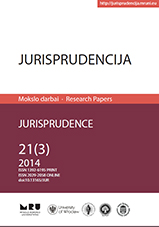EUROPOS SĄJUNGOS INSTITUCIJŲ TEISĖTAS IR NETEISĖTAS NEVEIKIMAS
Legal and Illegal Inaction of European Union Institutions
Author(s): Arvydas BudnikasSubject(s): Law, Constitution, Jurisprudence
Published by: Mykolas Romeris University
Keywords: EU institutions, actions for failure to act; TFEU Article 265; inaction; discretion; obligation
Summary/Abstract: Actions for failure to act against European Union (hereinafter also referred to as EU) institutions are governed by Article 265 of the Treaty on the Functioning of the European Union (hereinafter referred to as TFEU). These actions can be successfully brought before the EU courts only in cases where there is illegal inaction on the part of EU institutions. In legal doctrine and EU courts case law, the nature and scope of illegal inaction is not revealed comprehensively. This legal gap causes some serious difficulties for complainants and defending institutions. As it is apparent from the EU courts case law, complainants try to declare reasonable inaction as illegal before the EU courts. In some circumstances, there is no possibility to declare inaction as illegal, notwithstanding complainants are trying to do so and supersede the case law of the EU courts. In such cases, defending EU institutions also incur unnecessary expenses and time losses. The aim of this article is to disclose necessary criteria to assess whether inaction is illegal and provide a significant case law in this area. The article is composed of four constituent parts. Firstly, the concept of inaction is defined. Secondly, it is analyzed what inaction is legal and therefore cannot be declared as illegal before the EU courts. Thirdly, in the third and fourth parts, illegal inaction is being identified. Inaction occurs when EU institution fails to adopt a decision or decides not to take action. However, not every inactivity is considered unlawful. EU case law confirms that discretion and obligation are two concepts which help to distinguish legal and illegal inaction. Inaction is lawful if the EU institution has wide discretion to choose whether to act and such discretion is not limited to acting conditions. The scope of discretion is identified from the EU law. Dispositive EU law without certain conditions to act shows that the EU institution has a wide discretion to choose whether to act or not. Discretion is usually identified from the word “may”. However, when the EU institution has a narrow discretion which can be identified from conditional EU law, it is obliged to use that discretion and such failure to act can be considered as unlawful. Illegal inaction is usually declared when EU institutions have no discretion but are obliged by imperative EU law to act. Conclusions can be drawn that when the EU institution has a wide discretion to choose whether to act or not, its inaction cannot be declared illegal. However, if the EU institution has a narrow discretion or obligation to act, its failure to act can be declared as unlawful.
Journal: Jurisprudencija
- Issue Year: 21/2014
- Issue No: 3
- Page Range: 707-730
- Page Count: 24
- Language: Lithuanian

